Khobar- As Venezuela’s President Nicolas Maduro tries to rally support for a meeting among the world’s largest oil producers, to put down new rates on crude oil, most of Organization of the Petroleum Exporting Countries (OPEC)’s giants sustain high and unprecedented production rates.
Most oil producers uphold high production for different reasons, most prominently is to meet the demands of Asia’s competitive market.
Venezuela, a member OPEC, is suffering from an economic and political crisis and relies heavily on oil export revenues.
President Nicolas Maduro said on Tuesday night on state television that he was in talks with several other oil exporters to organize a meeting on production.
“I spoke today with King Salman of Saudi Arabia. In the coming hours, I will speak to the Emir of Qatar. I sent a communique to President Vladimir Putin (of Russia). I’m going to speak too with President Rouhani from Iran. I’m in touch with President Correa (of Ecuador), members of OPEC and non-OPEC (countries),” Maduro said on his weekly television show, adding that Venezuela was pushing to “stabilize” the oil price at $70 per barrel. Maduro believes that the given rate will not affect global economy.
However, Maduro’s efforts on freezing production added to the new rates proposed seems difficult in light of OPEC’s giant producers, such as Saudi Arabia, touching record-breaking production levels in July. Add to that, Iran also recently announcing reaching a record this month.
Russia is committed to sustaining astronomical production as to preserve shares in China and India. Based on all given data, analysts met Venezuela’s calls with skepticism.
“Another round of proposed production freeze talks by OPEC failed to excite investors,” ANZ Bank said on Wednesday.
Russia, the world’s largest oil producer, said on Monday it did not see any ground for new talks on freezing oil output but said it was open to negotiations.
Since the plunge in oil prices in 2014, Venezuela has repeatedly tried to broker deals to freeze production and reduce a supply glut, with limited success, as no oil producer was willing to cede market share by voluntarily cutting output, instead expecting competing exporters to restrict production.
As a result, OPEC members and other producers including Russia did not manage to reach an agreement on freezing supply at a meeting held in Doha in April. OPEC members are scheduled to meet informally in September.
Mohammad Al Ramadi, economic analyst and former instructor at the King Fahd University of Petroleum and Minerals said that realistically- after looking into hard facts- everyone is at high production levels, and Venezuela seeks lower rates due to its drained economic situation home. However, Ramadi said that Venezuela’s case is excruciatingly difficult and will not recover unless rates fall under $40.
According to OPEC’s monthly July report, the 14-member organization registered a record production which suggests that market surplus might continue through till next year.
Saudi Arabia informed other OPEC members that production has been raised in July to a new high, which is seen by most analysts as an indicator that oil giants are still focused on appropriated market shares instead of settling excess supply through restricting production.
